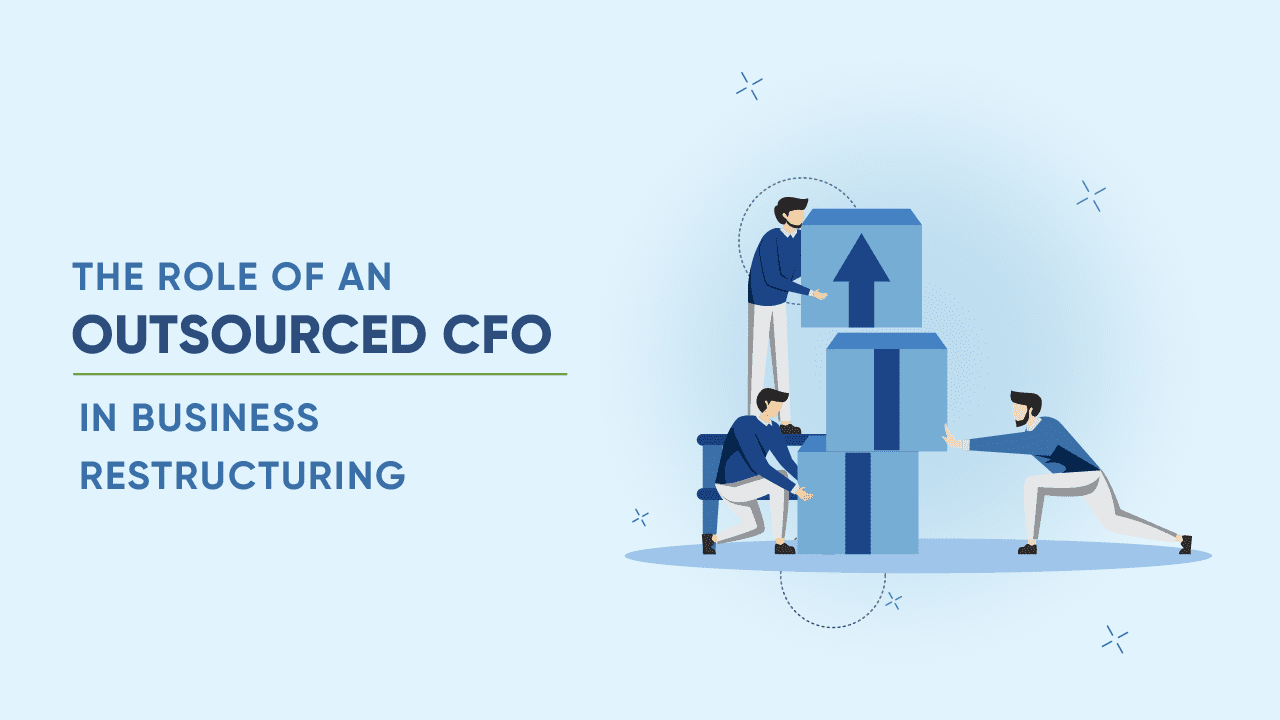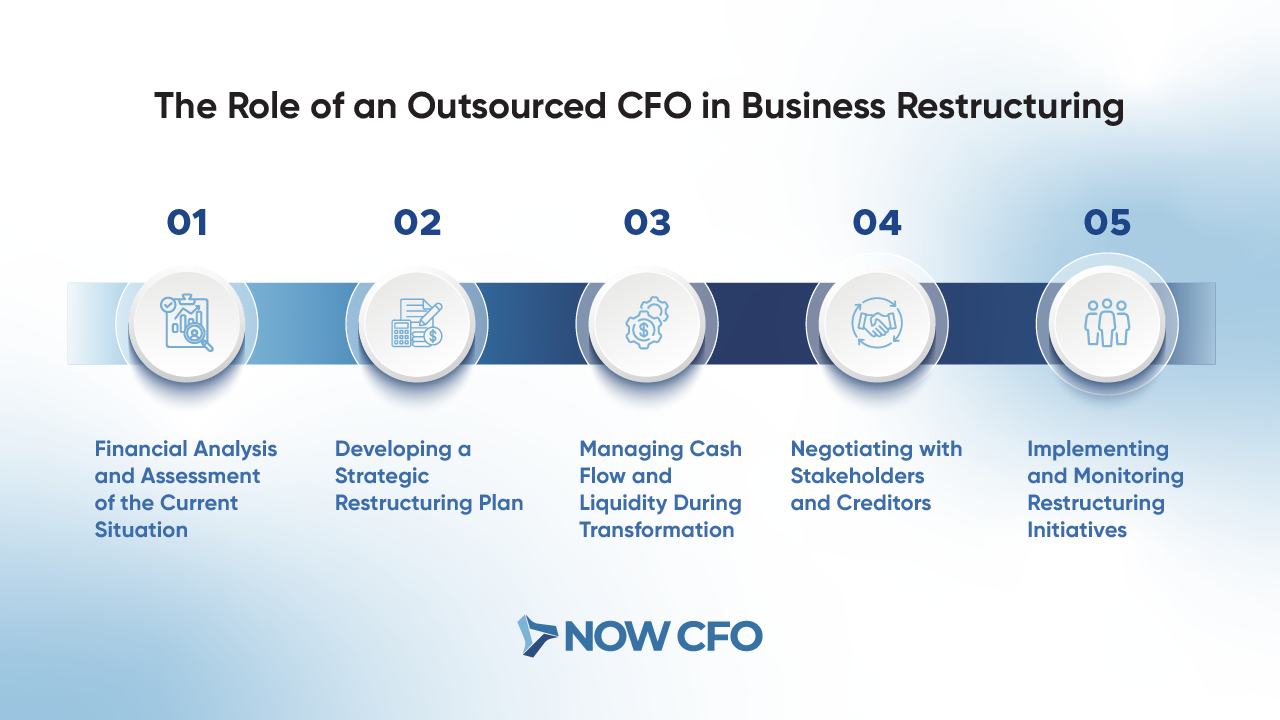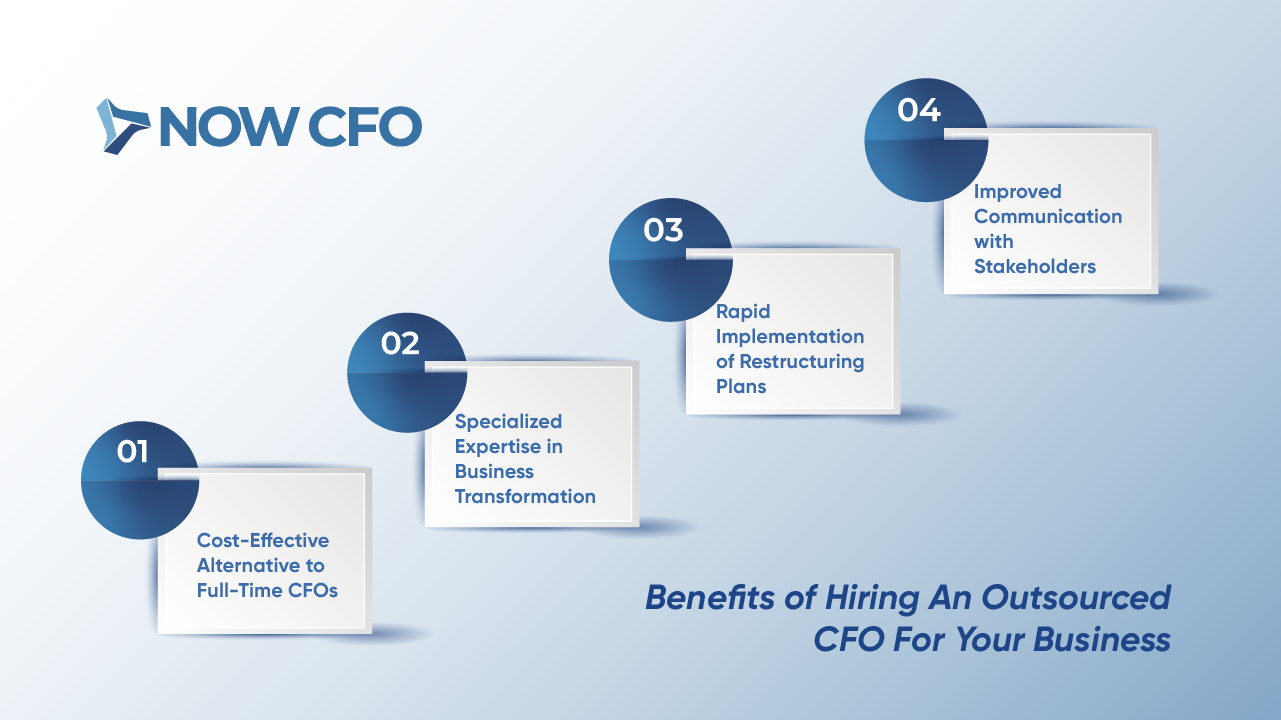
Businesses must restructure to remain competitive and financially stable in the face of economic uncertainty and evolving market dynamics. According to industry experts, over 80% anticipate a continued increase in restructuring activities as companies adapt to new challenges and opportunities.
This process requires strategic planning, financial expertise, and decisive action to address inefficiencies and unlock growth potential. For many businesses, engaging an outsourced CFO in business restructuring provides the critical knowledge and objectivity needed to guide the process effectively.
What is Business Restructuring?
Business restructuring involves reorganizing a company’s internal framework to enhance efficiency and adapt to evolving market conditions. This process can encompass various strategies tailored to address specific organizational needs.
Definition and Types of Business Restructuring
At its core, business restructuring refers to the comprehensive overhaul of a company’s structure, operations, or finances to improve performance and ensure long-term viability. This can be achieved through several approaches:
- Organizational Restructuring: This strategy modifies the company’s internal hierarchy. It may involve eliminating redundant roles, merging departments, or creating new positions to streamline operations and enhance communication. For instance, a company might consolidate its marketing and sales teams to foster better collaboration.
- Operational Restructuring: Here, the emphasis is on refining daily processes. This could include adopting automation technologies, outsourcing non-core activities, or eliminating redundant procedures to boost efficiency. A practical example is a business implementing automated inventory management systems to reduce manual errors.
- Financial Restructuring: This approach aims to stabilize the company’s financial health. Methods involve consolidating debt, negotiating lower interest rates, or converting debt into equity. Such strategies can alleviate financial burdens and improve cash flow.
- Divestitures: A company decides to sell or spin off underperforming or non-core assets in this scenario. This could mean selling a subsidiary that is not aligned with the company’s primary objectives, freeing up resources for more critical areas.
- M&A: This involves combining with or purchasing another company. Post-M&A restructuring is often necessary to integrate operations, eliminate redundancies, and achieve synergies. For example, a company might merge overlapping departments to optimize resources after acquiring a competitor.
Each restructuring type serves a unique purpose, and businesses may employ one or a combination to address their specific challenges.
Why Companies Undergo Restructuring
Companies opt for restructuring for various reasons, often driven by the need to remain competitive and financially sound. One primary motivation is cost reduction. By streamlining operations and eliminating inefficiencies, businesses can significantly decrease expenses.
Another compelling reason is to adapt to market changes. As industries evolve, companies must pivot to stay relevant. This could involve restructuring product lines or services to meet shifting consumer demand.
Additionally, companies facing financial distress may restructure to avoid bankruptcy. A business can improve its economic standing and continue operations by renegotiating debt terms or divesting non-core assets.
Furthermore, restructuring can be a proactive measure to enhance efficiency. By reevaluating and modifying internal processes, companies can boost productivity and better position themselves for future growth.
Different Types of Business Restructuring
In the dynamic business landscape, companies often undergo various forms of restructuring to enhance efficiency, adapt to market changes, or address financial challenges. Each restructuring type serves a specific purpose and involves distinct strategies.
Cost Restructuring
Cost restructuring focuses on reducing operational expenses to improve profitability. This may involve streamlining processes, renegotiating supplier contracts, or implementing energy-efficient technologies. For example, a company might adopt automation to decrease labor costs.
According to the U.S. Courts, business bankruptcy filings rose 40.4% from 13,481 to 18,926 in the year ending Dec. 31, 2023, highlighting the importance of proactive cost management.
Legal Structuring
Legal structuring entails modifying a company’s legal framework to optimize tax obligations, comply with regulations, or facilitate mergers and acquisitions. This could include changing the business entity type, such as transitioning from a partnership to a corporation, to benefit from limited liability and potential tax advantages.
Mergers and Acquisitions
M&A involves combining two or more companies to achieve synergies, expand market share, or acquire new technologies. Post-M&A restructuring is often necessary to integrate operations, cultures, and systems effectively. For instance, a company might consolidate overlapping departments after acquiring a competitor to reduce redundancies.
Divestment
Divestment involves selling off non-core or underperforming assets, divisions, or subsidiaries to focus on core business areas. This strategy can generate capital, reduce debt, and improve operational efficiency. For example, a conglomerate might sell a less profitable division to concentrate resources on more lucrative segments.
Reposition Restructuring
Reposition restructuring focuses on changing a company’s market position or product offering to align with consumer demand. This may involve rebranding, altering marketing strategies, or developing new products. For instance, a company might shift from traditional retail to e-commerce to capture a growing online customer base.
Spin-off Restructuring
Spin-off restructuring entails creating a new, independent company by separating a division or subsidiary from the parent organization. This allows both entities to focus on their specific markets and operational goals.
Turnaround Restructuring
Turnaround restructuring is implemented when a company faces significant financial distress. Strategies may include cost-cutting, asset liquidation, or leadership changes to restore profitability and prevent insolvency.
Understanding these restructuring types enables businesses to select and implement the most appropriate strategies to navigate challenges and achieve long-term success.
The Role of an Outsourced CFO in Business Restructuring
In business restructuring, the CFO is pivotal in steering the company towards financial stability and operational efficiency. Their responsibilities encompass a range of strategic and analytical tasks essential for successful transformation.

Financial Analysis and Assessment of the Current Situation
Initially, the CFO conducts a comprehensive financial analysis to evaluate the company’s current standing. This involves scrutinizing financial statements, cash flow reports, and market conditions to identify areas of concern and opportunities for improvement.
By understanding the organization’s economic health, the CFO can pinpoint inefficiencies and potential risks that need to be addressed during restructuring.
Developing a Strategic Restructuring Plan
Subsequently, the CFO collaborates with executive leadership to formulate a strategic restructuring plan. This plan outlines the steps necessary to achieve financial stability and operational efficiency. It includes setting clear objectives, defining key performance indicators, and establishing timelines.
Managing Cash Flow and Liquidity During Transformation
Maintaining adequate cash flow and liquidity is crucial during the restructuring process. The CFO meticulously monitors cash inflows and outflows, implements cost-control measures, and explores financing options if needed. By effectively managing liquidity, the CFO ensures the company can meet its financial obligations and invest in critical areas during the transition.
Negotiating with Stakeholders and Creditors
Effective communication with stakeholders and creditors is vital during restructuring. The CFO negotiates to restructure debt, secure favorable terms, and maintain stakeholder confidence. This may involve presenting detailed financial analyses and demonstrating the viability of the restructuring plan to gain support from investors, lenders, and other key parties.
Implementing and Monitoring Restructuring Initiatives
Finally, the CFO oversees the implementation of restructuring initiatives, ensuring that each step is executed as planned. They monitor progress against established benchmarks and adjust strategies as necessary to address emerging challenges.
How an Outsourced CFO Supports the Restructuring Process
In the complex landscape of business restructuring, an outsourced CFO offers invaluable support by bringing specialized expertise and an external perspective to the process. Their multifaceted contributions encompass strategic planning, objective decision-making, adaptability, and advanced data analysis.
Expertise in Financial Turnaround Strategies
An outsourced CFO brings a wealth of experience in financial turnaround planning, having worked with diverse companies facing similar challenges. They can quickly identify financial inefficiencies, implement cost-saving measures, and develop plans to restore profitability.
Objectivity and Unbiased Decision-Making
Being external to the organization, an outsourced CFO provides an unbiased perspective, free from internal politics or preconceived notions. This objective allows them to make impartial assessments and recommend decisions solely based on the company’s best interests.
Flexibility and Adaptability in Changing Situations
Outsourced CFOs are accustomed to working in various industries and adapting to different corporate cultures. This flexibility enables them to navigate the unique challenges of each restructuring scenario effectively. Whether scaling operations up or down, entering new markets, or divesting non-core assets, they can adjust strategies in response to evolving business environments.
Access to Financial Tools and Data Analysis for Informed Decisions
Outsourced CFOs are equipped with advanced financial tools and data analysis expertise, allowing them to provide detailed insights into the company’s financial health. They utilize sophisticated modeling techniques to forecast outcomes, assess risks, and evaluate the potential impact of various CFO restructuring strategies.
By leveraging the specialized skills of an outsourced CFO, companies can navigate the complexities of restructuring with greater confidence and precision, ultimately leading to a more successful transformation.
Benefits of Hiring an Outsourced CFO for Business Restructuring
Engaging an outsourced CFO during business restructuring offers several advantages that can significantly enhance the process. These benefits include cost savings, specialized expertise, swift execution of plans, and improved stakeholder communication.

Cost-Effective Alternative to Full-Time CFOs
Hiring a full-time CFO entails substantial expenses, including salary, benefits, and overhead costs. In contrast, an outsourced CFO flexibly provides top-tier financial expertise, allowing businesses to pay only for necessary services. This approach is particularly beneficial for small to medium-sized enterprises aiming to optimize resources during restructuring.
Specialized Expertise in Business Transformation
Outsourced CFOs often possess diverse experience across various industries and restructuring scenarios. This breadth of knowledge enables them to offer specialized strategies tailored to a company’s unique challenges.
Their proficiency in financial analysis for restructuring, risk management, and strategic planning ensures that the process is effective and aligns with industry’s best practices.
Rapid Implementation of Restructuring Plans
The flexibility of outsourced CFOs allows for the swift development and execution of restructuring initiatives. Without the need for lengthy onboarding processes, these professionals can quickly assess the company’s financial situation, identify critical areas for improvement, and implement strategies to stabilize and enhance performance.
Improved Communication with Stakeholders
An outsourced CFO brings an objective perspective, facilitating transparent and effective communication with stakeholders, including investors, creditors, and employees. Their impartiality helps them present restructuring plans convincingly, address concerns, and build trust among all parties involved, which is crucial for successfully executing restructuring efforts.
By leveraging the advantages of an outsourced CFO, companies can navigate the complexities of restructuring more efficiently, ensuring a smoother transition toward financial stability and growth.
How to Choose the Right Outsourced CFO for Business Restructuring
Selecting the appropriate outsourced CFO is crucial for successful business restructuring. The right choice can significantly influence the outcome of your transformation efforts.
Look for Experience in Restructuring and Turnaround
Begin by evaluating candidates’ backgrounds in handling restructuring and turnaround situations. An outsourced CFO with a proven track record in these areas will understand the complexities and navigate challenges effectively. Their experience enables them to implement strategies that stabilize finances and guide the company to profitability.
For instance, they might have previously led initiatives that successfully reduced operational costs and improved cash flow during a turnaround.
Assess Their Strategic and Financial Planning Skills
Next, assess the candidate’s proficiency in strategic and financial planning. A competent outsourced CFO should be adept at developing comprehensive financial strategies that align with your business goals and create detailed financial forecasts, budgets, and plans that facilitate informed decision-making.
Verify Their Track Record with Similar Businesses
It’s also essential to verify the CFO’s experience with businesses similar to yours in size, industry, or market dynamics. A CFO who successfully manages restructuring in comparable companies will be more attuned to your specific challenges and opportunities.
They can apply lessons from past experiences to your situation, increasing the likelihood of a successful restructuring. For instance, if your company operates in manufacturing, a CFO with experience in that sector will understand industry-specific financial nuances.
Ensure Their Approach Aligns with Your Business Needs
Ensure that the CFO’s approach to restructuring aligns with your company’s culture and objectives. They should demonstrate flexibility and a willingness to tailor their strategies to your unique circumstances. This alignment ensures smoother implementation of restructuring plans and fosters collaboration.
Confirm They Have Strong Negotiation and Communication Skills
Finally, strong negotiation and communication skills are essential for an outsourced CFO. They must negotiate with creditors, stakeholders, and possibly employees during the restructuring process. Effective communication ensures that all parties are informed and aligned, reducing change resistance.
Conclusion: Leveraging an Outsourced CFO for Successful Restructuring
Business restructuring is challenging but essential for companies aiming to achieve stability and growth in uncertain times. Partnering with an outsourced CFO in business restructuring equips organizations with the expertise, objectivity, and tools to navigate complexities effectively. Whether it’s optimizing cash flow, developing strategic plans, or negotiating with stakeholders, exemplary financial leadership can make all the difference.
Ready to take the next step in your restructuring journey? Schedule a free consultation with our team of experienced outsourced CFO for business transformation, or visit our website to learn more about how we can support your transformation. Let us help you build a roadmap to long-term success!














